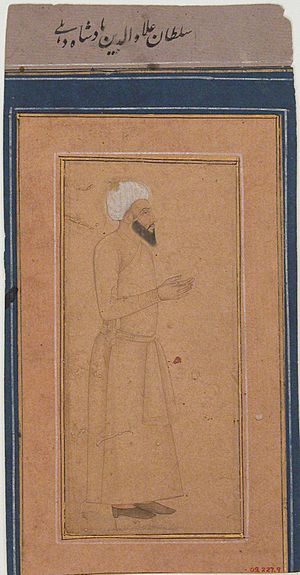Ala-ud-din Khalji facts for kids
Quick facts for kids Ala-ud-din Khalji |
|
|---|---|
| Sultan Sikander Sani |
|

A 17th century painting of Alauddin Khalji
|
|
| Sultan of Delhi | |
| Reign | 19 July 1296–4 January 1316 |
| Coronation | 21 October 1296 |
| Predecessor | Jalaluddin Firuz Khalji |
| Successor | Shihabuddin Omar |
| Governor of Awadh | |
| Tenure | c. 1296–19 July 1296 |
| Governor of Kara | |
| Tenure | c. 1291–1296 |
| Predecessor | Malik Chajju |
| Successor | ʿAlāʾ ul-Mulk |
| Amir-i-Tuzuk (equivalent to Master of ceremonies) | |
| Tenure | c. 1290–1291 |
| Born | Ali Gurshasp c.1266–1267 |
| Died | 4 January 1316 Delhi, India |
| House | Khalji dynasty |
Ala-ud-din Khalji was a powerful ruler of the Khalji dynasty. He ruled the Delhi Sultanate from 1296 to 1316. He was the second and most influential ruler of his family. Ala-ud-din was the nephew and son-in-law of the previous ruler, Jalal-ud-din Khalji. He had a son named Khusrau Malik. Ala-ud-din Khalji wanted to be as famous as Alexander the Great. He even took the special title ‘Sikander-i-Sani’, which means 'Second Alexander'. During his rule, he made some big changes, like controlling the sale of alcohol in public.
Contents
Military Victories of Ala-ud-din Khalji
Ala-ud-din Khalji was a very successful military leader. He expanded his empire greatly through many battles. His army was strong and well-organized.
Conquering Northern India
Ala-ud-din Khalji first conquered Gujarat and Malwa. These were important regions in India. In 1301, he took control of Ranthambore, a strong fort. Two years later, in 1303, he captured Chittor. These victories helped him control more of northern India.
Campaigns in Southern India
After securing the north, Ala-ud-din sent a large army to South India. This army was led by his trusted general, Malik Kafur. Malik Kafur's army defeated several powerful kingdoms. These included the Yadavas, Kakatiyas, Hoysalas, and Pandyas. They also brought back a lot of wealth from these campaigns. By the end of his rule, Ala-ud-din Khalji's empire was huge. It was almost as large as the empire of Ashoka the Great, a famous ancient Indian emperor.
Economic Policies and Trade Control
Ala-ud-din Khalji needed a lot of money to keep his large army. He introduced several new rules to manage the economy. These rules helped him collect more taxes and control prices.
Collecting Taxes and Preventing Corruption
The main way he got money was through taxes. He made sure that land tax was fair. It was based on how fertile the land was. In the very fertile Ganga-Yamuna doab region, the land tax was half of what farmers produced. He also kept a close watch on the nobles. A special group of officers worked to stop corruption. He also started a system of auditing accounts. This helped make sure everyone was honest with money.
Controlling Market Prices
Ala-ud-din Khalji introduced a special market control policy. He lowered the prices of everyday items. Things like sugar, oil, and cloth became cheaper. Shop owners had to sell their goods at prices set by the ruler. Officials were appointed to check on shop owners. Anyone caught cheating was punished. This policy helped him pay a lower salary to his soldiers. This was because their money could buy more.
Army Improvements and Security
With enough money, Ala-ud-din Khalji built and maintained a very large army. He made important changes to make his army stronger and more loyal.
Paying Soldiers and Tracking Horses
He paid his soldiers in cash. This was a new system at the time. He also started branding horses with a special mark (called Dagh). This stopped people from swapping good horses for low-quality ones. He also kept a detailed description of every soldier in his army (called Chehra). This helped him keep track of his forces.
Preventing Rebellions
To keep his empire safe, Ala-ud-din Khalji used spies. He placed them all over his empire. Their job was to find out about any possible rebellions. This helped him stop problems before they became big.
Related pages
Images for kids
-
Tomb of Alauddin Khalji, Qutb complex, Delhi
-
Courts to the east of Quwwat ul-Islam mosque, in Qutb complex added by Khalji in 1300 CE.
-
Alauddin's Madrasa, Qutb complex, Mehrauli, which also has his tomb to the south.
-
The unfinished Alai Minar
See also
 In Spanish: Alaudín para niños
In Spanish: Alaudín para niños
 | Jessica Watkins |
 | Robert Henry Lawrence Jr. |
 | Mae Jemison |
 | Sian Proctor |
 | Guion Bluford |


















